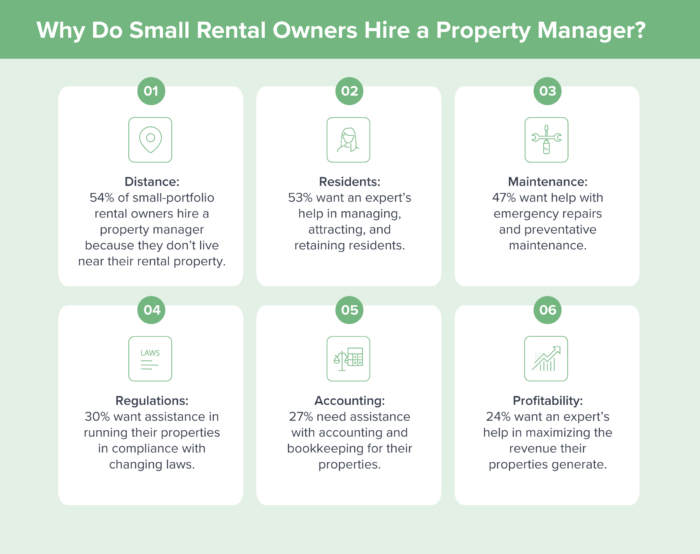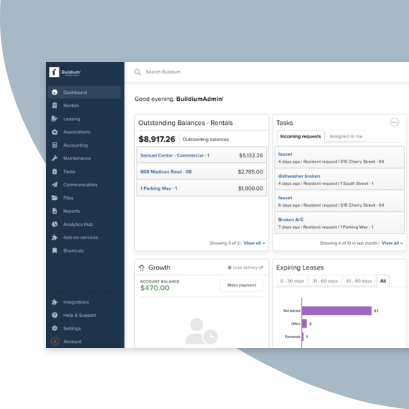Becoming a property manager can be a rewarding career path, offering a blend of real estate knowledge, customer service, and business management. This guide will walk you through the essential steps, from gaining experience to earning necessary certifications and licenses, so that you’re well-equipped to be the property manager you want to be.
We’ll explore the skills needed for success, typical career paths, and answer key questions such as “What does a property manager do?”, “How much do property managers make?”, and “How long does it take to become a property manager?”.
What Does a Property Manager Do?
A property manager is responsible for overseeing the daily operations of rental properties. Traditionally, they have taken on day-to-day tasks such as maintenance, marketing, and leasing, for their owners. More specifically, their duties usually include:
- Collecting rent and managing tenant relations
- Handling maintenance requests and repairs
- Marketing properties to attract new tenants
- Preparing and managing budgets
- Conducting property inspections
- Managing lease agreements and renewals
More and more, however, owners are looking to property managers to help them increase revenue through financial reporting and benchmarking, investment advice, and new construction. They’re also relying on their property managers to help them navigate the ever-growing number of regulations around rental housing.
Why Do Small Rental Owners Hire a Property Manager?
According to Buildium’s Property Management Industry Report, there are several reasons why rental owners hire property managers.

- Distance: 54% of small-portfolio rental owners hire a property manager because they don’t live near their rental property.
- Residents: 53% want an expert’s help in managing, attracting, and retaining residents.
- Maintenance: 47% want help with emergency repairs and preventative maintenance.
- Regulations: 30% want assistance in running their properties in compliance with changing laws.
- Accounting: 27% need assistance with accounting and bookkeeping for their properties.
- Profitability: 24% want an expert’s help in maximizing the revenue their properties generate.
What Are Owners Looking for in a Property Manager?
Rental property owners want a property manager who can keep the operations of their properties running smoothly, focus on tenant satisfaction, and generate profit. Key qualities that owners look for include:
Experience and Expertise: Owners prefer property managers with a solid background in real estate management, evidenced by prior roles such as leasing agents or assistant property managers. Proven experience in handling tenant relations, maintenance issues, and financial management is important.
Strong Communication Skills: Since property managers often act as an intermediary between owners and tenants, communication is key. Owners look for managers who can articulate issues clearly, resolve conflicts amicably, and deliver regular updates on property statuses.
Organizational Abilities: Property management involves juggling multiple tasks, from collecting rent to coordinating repairs. Owners value managers who demonstrate excellent organizational skills and can handle these responsibilities smoothly.
Knowledge of Local Laws and Regulations: Compliance with local property laws and regulations is non-negotiable. Owners seek managers who are well-versed in these legal requirements to avoid any potential legal complications.
A Technology Offering: So much of property management is now automated through apps and full property management software suites. Owners are looking for property managers who not only know their way around software, but can use it to streamline work, increase profitability, and even scale their portfolios.
Marketing Skills: Attracting new tenants is a vital part of maintaining property occupancy. Owners appreciate managers who can market their properties, showcasing them in the best light to prospective tenants.
Financial Acumen: Property management is not just about handling the day-to-day operations; it also involves managing budgets, preparing financial reports, and ensuring the property remains profitable.
Reliability and Trustworthiness: Finally, owners need to trust that their property manager will act in their best interests. This involves being reliable, proactive, and transparent in all dealings.
With these qualities, a property manager can meet the high expectations of rental property owners and ensure the successful management of their properties.
How Much Do Property Managers Make?
Property managers’ salaries can vary based on several factors, including the location in which they operate, the types of properties they manage, and years of experience.
According to Salary.com, property managers make between $80,000 and $150,000 per year. Your exact salary depends on where you are located and your level of experience.
Those property managers who own their own property management businesses can see even higher earnings, depending on the size and success of their business. Their income is heavily influenced by the number of properties they manage and the profitability of their operations.
In larger metropolitan areas, property managers can command higher salaries due to the higher cost of living and the increased complexity of managing properties in these regions. For instance, property managers in New York City or San Francisco may earn significantly more than those in smaller towns or rural areas.
Finally, some property managers may receive bonuses or commissions based on the performance and occupancy rates of the properties they manage.
How Long Does It Take to Become a Property Manager?
The time it takes to become a property manager can vary depending on your background and the requirements of the state in which you live. Generally, it can take anywhere from six months to two years to gain the necessary experience, complete required education, and obtain licensing. For those transitioning from related fields, such as real estate or customer service, the process may be quicker.
Gaining experience in roles like leasing agent, maintenance coordinator, or assistant property manager can expedite your journey. Additionally, completing certifications and licensing requirements promptly will also speed up the timeline.
Steps to Becoming a Property Manager
Now that you have a handle on what a property manager is, let’s talk about the steps you need to become one.
1. Gain Relevant Experience
Before becoming a property manager, gaining experience in real estate, customer service, or business management can be highly beneficial. Many property managers start their careers in roles such as leasing agents, maintenance coordinators, or assistant property managers. These positions offer valuable insights into property operations, tenant relations, and financial management.
Working in these entry-level positions allows you to understand the intricacies of property management, from handling tenant complaints to ensuring timely rent collection. Over time, this experience will build a solid foundation for your career as a property manager.
2. Obtain Required Education
While not always mandatory, having a degree in business administration, real estate, or a related field can enhance your credibility and knowledge. Some universities offer specific courses in property management, which can provide a solid foundation for your career.
In addition to formal education, numerous online courses and workshops focus on property management. These educational opportunities can provide you with the latest industry trends, legal requirements, and best practices in property management.
3. Get Certified
Obtaining property management certifications can boost your credentials and demonstrate your commitment to the profession. Some recognized certifications include:
- Certified Property Manager (CPM): Offered by the Institute of Real Estate Management (IREM), this certification is highly regarded in the industry.
- Residential Management Professional (RMP): Provided by the National Association of Residential Property Managers (NARPM), this certification focuses on residential property management.
- Certified Apartment Manager (CAM): Offered by the National Apartment Association (NAA), this certification is ideal for those managing multifamily properties.
To learn more about property management certifications, check out our post.
4. Get Licensed
Licensing requirements for property managers vary by state. Some states require property managers to hold a real estate license, while others may have specific property management licenses. Here are a few examples:
- California: Property managers must hold a real estate broker’s license. The requirements include completing pre-licensing courses and passing a state exam.
- Florida: Property managers must have a real estate broker’s license if they’re managing properties for others. That includes completing 63 hours of pre-licensing coursework and passing the state exam.
- Georgia: Property managers need a community association manager (CAM) license. That requires completing 25 hours of CAM pre-licensing education and passing the state exam.
Check your state’s regulations and complete any required coursework or exams to become licensed.
5. Develop Key Skills
Successful property managers possess a blend of technical and interpersonal skills. Some essential skills include:
- Communication: Effectively interacting with tenants, property owners, and maintenance staff
- Organization: Managing multiple properties and tasks simultaneously
- Problem-Solving: Addressing maintenance issues and tenant complaints promptly.
- Financial Acumen: Preparing budgets, managing expenses, and maximizing property profitability.
- Negotiation: Handling lease agreements and tenant disputes.
Continuous skill development is important to stay competitive in the property management industry. Attending workshops, seminars, and industry conferences can help you stay updated on the latest trends and best practices.
6. Build a Network
Networking with other professionals in the real estate and property management industry can open doors to job opportunities and provide valuable insights. Joining organizations such as IREM, NARPM, or local real estate associations can help you connect with peers and stay updated on industry trends.
Building a strong professional network can also lead to mentorship opportunities, where experienced property managers can offer guidance and advice as you advance in your career.
7. Start Your Own Property Management Business
For those aspiring to start a property management business, creating a solid business plan is the first step. Consider the following steps:
- Market Research: Identify your target market and competitors.
- Business Structure: Decide on the legal structure of your business (e.g., LLC, corporation).
- Licensing and Registration: Obtain the necessary licenses and register your business with the appropriate authorities.
- Insurance: Secure insurance coverage to protect your business and properties.
- Marketing: Develop a marketing strategy to attract property owners and tenants.
To learn more about how to start a property management company, check out our post.
Career Paths to Property Management
Many property managers transition from related careers where they have gained relevant skills and experience. Some common career paths include:
- Real Estate Agents: Their knowledge of the housing market and client relations provides a strong foundation.
- Leasing Agents: Experience in leasing and tenant management is directly transferable.
- Maintenance Coordinators: Understanding property maintenance needs and coordinating repairs is a key part of property management.
- Customer Service Representatives: Handling tenant inquiries and resolving issues requires excellent customer service skills.
Property Management Technology
Property management software is an indispensable tool for any aspiring property manager. Leveraging these platforms can streamline your operations, enhance tenant satisfaction, and optimize financial performance.
Familiarize yourself with all the functionalities property management software offers, including tenant management, maintenance tracking, financial reporting, lease management, and communication tools.
Stay up to date with apps and software in the market, their cost, and their ratings. When it comes time to determine which software solutions are best for your property management business, you’ll be ready.
If you’d like to take property management software for a test drive, to see how it can help you build your property management business, check out Buildium’s 14-day free trial. There’s no credit card required, so you can test the software’s features without commitment.
Becoming a property manager involves a combination of education, certification, experience, and skill development. By following these steps and continuously improving your knowledge and network, you can build a successful career in property management. Whether you choose to work for a property management company or start your own business, the opportunities are vast and rewarding.
FAQs
What Qualifications Do I Need to Become a Property Manager?
To become a property manager, you typically need a combination of education, certification, and experience. A degree in business administration, real estate, or a related field is beneficial. Additionally, obtaining certifications such as the Certified Property Manager (CPM) or the Residential Management Professional (RMP) can enhance your credentials. Relevant experience in real estate or customer service can be important, as well.
Do I Need a License to Work as a Property Manager?
Licensing requirements for property managers vary by location. Some states or regions require property managers to hold a real estate license or a specific property management license. It’s important to research the regulations in your area and ensure you meet all necessary licensing and registration requirements before starting your career. To get started, check out Property Management Laws by State from All Property Management.
What Skills Are Essential for a Property Manager?
Property managers need a diverse skill set to succeed in their role. Key skills include strong communication and interpersonal abilities, organizational and time management skills, problem-solving capabilities, and a good understanding of property maintenance and financial management. Being proficient in technology and software used in property management is also advantageous.
How Can I Gain Experience in Property Management?
Gaining experience in property management can be achieved through various pathways. Consider starting in related roles such as real estate agent, leasing agent, or maintenance coordinator. Volunteering for property management tasks or internships can also provide valuable hands-on experience. Networking with industry professionals and seeking mentorship opportunities can further enhance your knowledge and skills.
What Are the Main Responsibilities of a Property Manager?
Property managers are responsible for overseeing the daily operations of rental properties. This includes managing tenant relations, handling maintenance and repairs, ensuring properties comply with local regulations, collecting rent, and managing budgets. They also market available properties, conduct tenant screenings, and address any issues that arise during tenancy.
How Do Property Managers Handle Tenant Disputes?
Handling tenant disputes requires effective communication and conflict resolution skills. Property managers must listen to tenant concerns, investigate complaints, and mediate between parties to reach a fair resolution. It’s important to follow legal guidelines and document all interactions and outcomes to protect both the landlord’s and tenants’ interests.
Can I Start My Own Property Management Business?
Yes, you can start your own property management business. To do so, you need to create a solid business plan that includes market research, defining your business structure, obtaining necessary licenses, securing insurance, and developing a marketing strategy. Leveraging your experience, skills, and professional network will be crucial in building a successful property management business.
What Are the Benefits of Joining Professional Organizations in the Property Management Industry?
Joining professional organizations such as the Institute of Real Estate Management (IREM) or the National Association of Residential Property Managers (NARPM) offers numerous benefits. These organizations provide opportunities for networking, continuing education, and staying updated on industry trends. Membership can also enhance your credibility and provide access to valuable resources and mentorship programs.
What Career Paths Can Lead to Property Management?
Several career paths can lead to a role in property management. Common pathways include working as a real estate agent, leasing agent, maintenance coordinator, or customer service representative. Each of these roles equips you with skills and experience that are transferable to property management, making the transition smoother and more seamless.
How Can I Stay Current with Industry Trends and Regulations?
Staying current with industry trends and regulations involves continuous learning and professional development. Subscribe to industry publications, attend conferences and workshops, and participate in webinars and online courses. Joining professional organizations and networking with peers can also help you stay informed about changes in regulations and best practices in property management.



